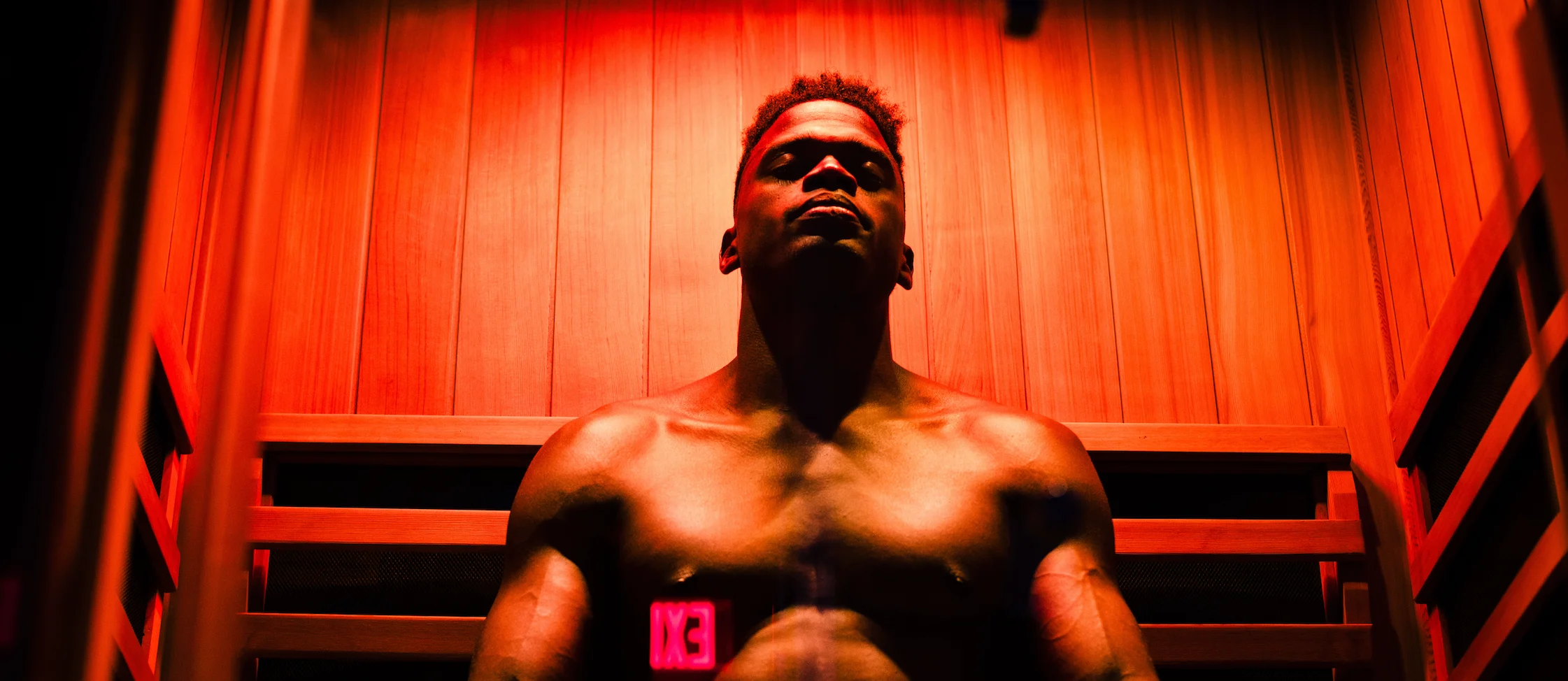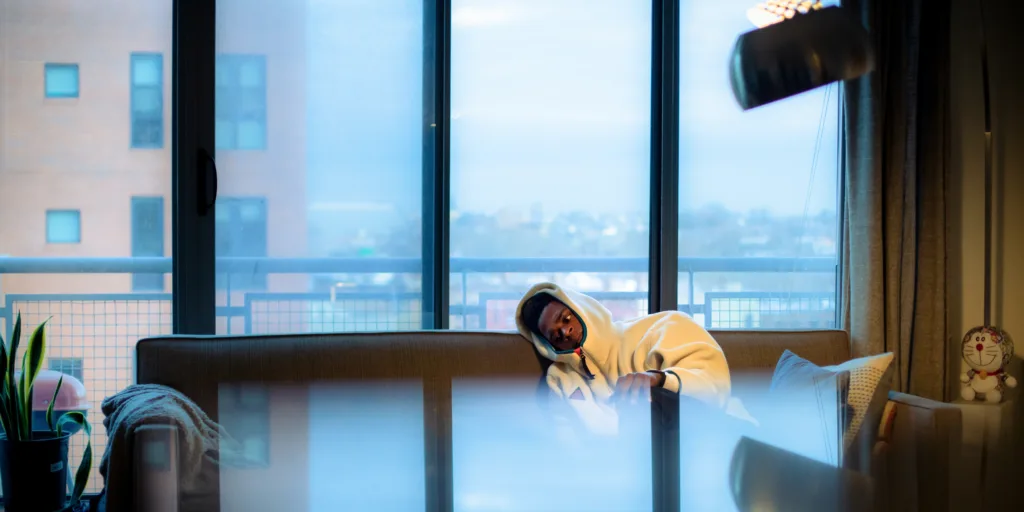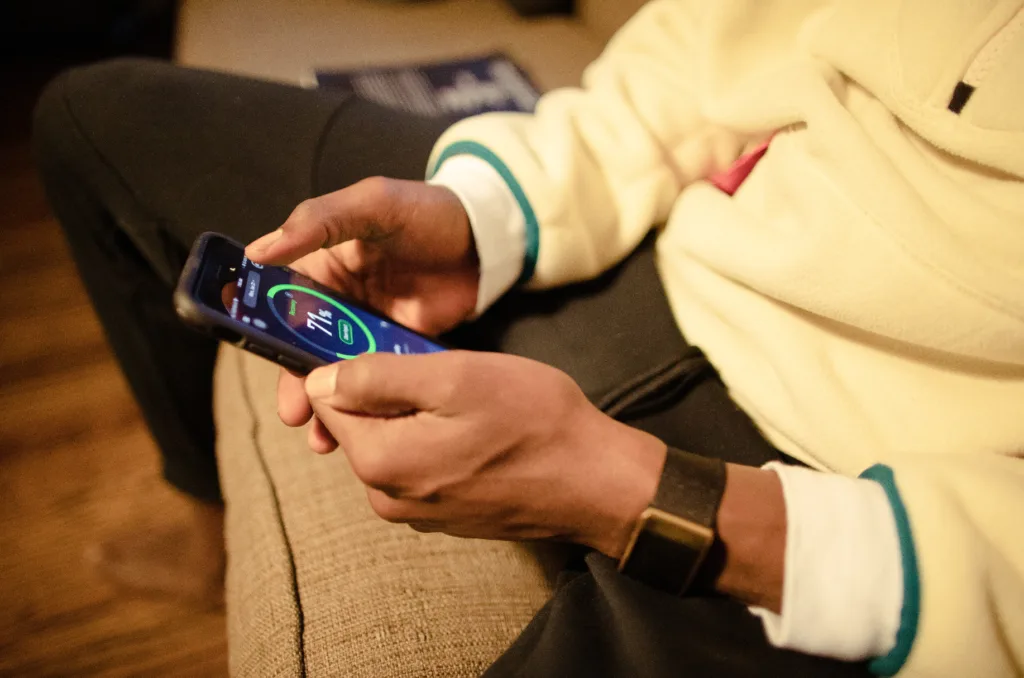Topics
- Article
- Health & Wellness
The Art of Self-Experimentation, as told by Joe Holder

It’s 6 am and Joe Holder is blasting his morning playlist, an all-over mix from Drake to Daft Punk, while trying to unpack from his recent trip to Paris.
https://youtu.be/kaUIifrtHnc He quietly sips on a blend of celery, apple, and ginger, which his Mom used to make for him as a kid. He travels often so he’s not home much, but his Bed Stuy apartment is a quiet haven away from the chaos of Manhattan. Soon, he’ll take the subway to 5th Ave where he’ll bounce around to train his clients, many of them high profile.
“You have to humble yourself before the great unknown.”
A former University of Pennsylvania wide receiver, Joe was accustomed to high expectations in both his academics and athleticism. The Ivy League program involved a lot of stressors--waking up early for practice, professors who didn’t take him seriously, tough coaches, and trying to maintain a social life. Joe was a walk-on who eventually became a starter, and the chip on his shoulder showed. “I was like, I’m going to prove everybody wrong. I’m just going to do what it is that I know I can do. Be methodical. Be deliberate. Make them regret not taking that chance on me.” Back then, you could say he was a nihilist throughout college. Competitive and driven, but disillusioned by a lack of purpose. He’d always been an anxious kid, but things started spiraling as he tried to navigate the pressures of school and sport. It hit home one night when he was coming back from a party and he forgot to call his dad to wish him a happy birthday. On top of that, he was battling multiple injuries and couldn’t play football. The reality set in and crushed him. So he decided to hit the reset button.

“Something’s Gotta Give.”
Joe’s nickname back then was “The Ferrari.” He was a super high-performer, but he was always in the shop. During college, he broke his ankle and consequently missed an entire season. His body had trouble healing, which he later discovered was much more than a physical limitation--it was driven by his mental state. “I was in such a dark and negative place. Basically my pain flare-ups wouldn’t go away, so I took the time to reevaluate my emotional health.” His recovery was no easy task. It took weeks, months, and years to start listening to his body and perfect a treatment that kept him healthy and functioning. When he bounced back from his ankle injury, he was hit with another devastating blow. This time, he had broken his leg. All of the hard work had seemingly amounted to nothing, but Joe had one of two options--sit back and sulk, or re-apply the lessons learned from his previous injury to spur on his recovery. Although doctors estimated he’d miss the remainder of the season, he came back in 4 weeks. Eventually, he graduated from UPenn with a better outlook and a stark realization; in order to be happy he wasn’t going to work for anybody anymore. He was going to continue working on himself and bring his health and performance mindset to the real world.
SELF-EXPERIMENTATION LEADS TO SELF-ACTUALIZATION
One of the first things you’ll notice about Joe when you meet him is his monk-like demeanor. He’s almost always wearing a hood, always has a book on hand, and speaks deliberately without wasting energy. In short, he’s a different person than he was 10 years ago, thanks to a constant dose of self-experimentation. What works for Joe might not work for everyone, which is why trial and error are critical to unlocking your best self, and ultimately your best performance. Joe’s main motivator is simple--not living in pain, whether that’s emotional pain or physical pain. So for him, it’s about getting back to a state of balance so he can help himself, and help others. “The saying that everybody has the same 24 hours isn’t really the case. We all have different lives, we all have different issues we deal with. If I’m in the green, then those 24 hours are much different than if I’m in the red and trying to take on the day.”

Self-experimentation has led to several tried and true methods that Joe swears by:
1. Honesty over Positivity: This might seem counterintuitive, but Joe believes being honest with yourself is better than forcing positivity. It wasn’t until Joe acknowledged the negative aspects of his life that he was able to make the commitment to change.
2. Meditation & Mindfulness: Finding a sense of peace throughout the day is incredibly important to Joe, especially in the morning. He believes humans are too distracted, and this is why some individuals do not make progress or change behaviors. “I call it popcorn brain, there’s so much stimuli popping at such a fast rate. We’re looking here, working there and nothing is sinking. Too many things get stuck in our working memory, instead of being assimilated to our base level programming. As result we don’t ever change or evolve as humans.”
3. Improving Digestion: On top of numerous other factors that affect his heart rate variability (HRV), Joe has noticed that eating right before bed causes his HRV to drop. Additionally, if he’s not digesting food properly during the day (digestion can be affected by traveling often, food intolerances, food quality, and more), he’ll see a decrease. Joe starts each morning with a self-made juice recipe to help his digestion, follows a vegetarian diet, and rarely drinks alcohol or caffeine.
4. Infrared Sauna: Joe has experimented with lots of cold and heat therapies, but lately he gravitates towards heat to improve circulation, relax muscles, and reduce soreness. Unlike traditional saunas, infrared saunas heat the body through electromagnetic radiation to warm your body directly, rather than the air around you.
5. Plant-Based Diet: Joe follows a vegetarian diet, which has dramatically improved his food digestion and absorption. It regularly includes foods like sweet potatoes, quinoa, spaghetti squash, chickpeas, leafy greens, seasonal fruit, pea protein, and nuts. For Joe, being vegetarian is a personal choice, grounded in what he calls “forced asceticism”--the belief that being mindful about what he eats will trickle into his other choices. He explains that you can still be plant-based by eating a minimally processed plant-based lifestyle from clean meat and fish sources. He’s dubbed this lifestyle the #plantbasedgang, which has amassed a loyal following and even a sweatshirt line.
6. Giving Back: The Ocho System is the foundation for everything Joe does. A play on the infinity symbol, the philosophy of “One can help others, others can help one” is a constant reminder to keep moving himself forward so he can help others realize their potential. The Ocho System is a symbol of gratitude, and a farewell to his former nihilism.
Optimizing recovery and performance is not about doing everything right; it’s about listening to your mind and body to cater to your specific needs. Once you find a rhythm you’ll see things change, whether that’s a boost in HRV, more restful sleep, or a sense of peace throughout the day. As you experiment, you may see indirect changes in your relationships, your career, and your personal pursuits as your body feels more prepared. To learn more about Joe, and get training, nutrition, and recovery advice, check out his Medium page. In addition, you can listen to his podcast episode with WHOOP CEO Will Ahmed where he talks about everything from training supermodels to his impressive WHOOP data. #inthegreen